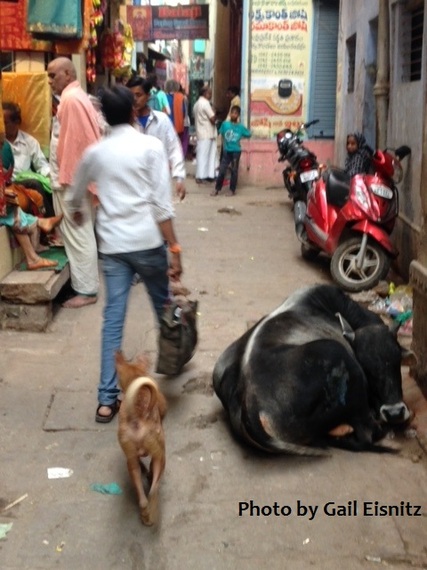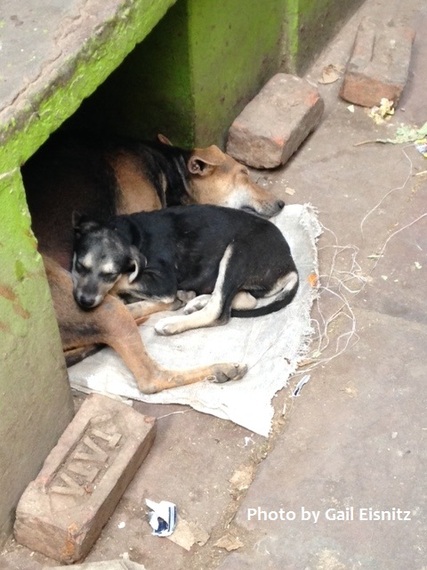An estimated 500 to 700 million dogs exist worldwide. According to a video from the Marchig Animal Welfare Trust of the UK, three quarters of them live on the streets of impoverished communities. Their life expectancy is just three years; the suffering is horrific, and the tragedy stretches beyond the canine victims.
According to the US CDC, in developing nations rabies kills 55,000 people each year, and over 95 percent of rabies cases in humans result from dog bites. According to the World Health Organization (WHO), 2 billion dollars is spent worldwide every year to provide prophylactic treatment for rabies to 9 to 12 million people who had been bitten by a potentially rabid animal. For people living with an ever present threat of rabies lurking nearby, street dogs appear as a dangerous vector, not a friend in need. The resulting collection and killing programs are incredibly cruel, and are largely ineffective at halting the disease; yet killing homeless dogs remains at the forefront of responses. The world is ready for a change.
Prevention is the only humane, effective solution. However, according to the online animal welfare news service Animals 24/7, between three quarters and 90 percent of dogs in the world receive no veterinary care during their lives. Until recently, for free-roaming animals, surgery was the only option for preventing puppies and kittens.
Spay/neuter is the gold standard for preventing litters. However, due to overwhelming numbers of animals that need surgery and aftercare for free, and the near-impossible logistics and cost of setting up and staffing clinics all over the globe, most will not have access to spay/neuter programs. A non-surgical contraceptive administered along with a rabies vaccine and parasite treatment could revolutionize the lives of millions of street dogs, and save human lives, for a fraction of the cost of surgical spay/neuter. Non-surgical options are the only way to cast a dramatically wider net of compassion.
Injectable sterilents and contraceptives are already here, and more are on the horizon. However, access to these products is not equal in terms of cost and availability. The competitive edge that drives development and marketing of pharmaceutical products is not a friend to the poor. We need non-surgical spay/neuter options that fit the chronic poverty niche in terms of ease of approval and cost to deliver.
Few people who work in the animal welfare field in impoverished communities are even aware of the options that exist. 
One example is injectable calcium chloride, a sterilent for male dogs. It is highly effective; according to recent research by Raffaella Leocci, DVM and published in peer reviewed Acta Veterinaria Scandinavica, it reduces testosterone. It is permanent, and the cost (including sedation, a rabies vaccine and parasite treatment) is as little as three dollars (USD) per dog. This drug is compounded from universally available pharmaceutical ingredients that are too common to be patented, a detail that makes it unattractive for investing the millions of dollars needed for FDA approval. Its' use is legal without FDA approval, making FDA approval into an expensive option that serves little purpose, especially in developing nations. This low-tech solution for neutering male dogs is nearly universally available to veterinarians. In addition to being easy on the budget, the necessary supplies and equipment fit nicely in a shoe box. It bridges the gap between effectiveness and cost. Yet as a compounded drug it is not distributed through a standard pharmaceutical marketing venue, so it has simply been overlooked for over three decades.
Private pharmaceutical research for animal sterilents geared toward FDA approval may increase convenience for pet owners, but the millions of dollars needed for FDA approval makes developing products for chronically impoverished areas far less attractive. Merely replacing spays and neuters in private clinics with something more convenient will not help the millions of animals for whom a litter can mean a slow, miserable death for mom and her offspring. It will also not address rabies and other diseases that place people at odds with street dogs. Research and development that is intended from the outset to help street dogs will deliver the solutions to those needing them most. Low cost and low-tech are vital to creating change.
In addition to products that cannot be patented, like calcium chloride, certain products with expired patents also make it possible to prevent litters for just pennies.
It will be up to those who advocate for animals and the communities they live in to demand that products that are ideal for use in underserved areas be recognized and, when appropriate, be used. They will not always be equal to surgical spaying and neutering, some will require boosters and vaccines are not one hundred percent effective, but their potential needs to be recognized if they are safe, effective options that bring veterinary care to millions of animals that otherwise suffer without. If pennies can make a huge difference, halting suffering should not have to wait for dollars.
Only by focusing research and development on creating safe, low cost products that are accessible worldwide will animals in chronic poverty get the help they deserve. With overlapping issues of poverty, zoonotic diseases (diseases that can be transmitted to people that include rabies), war zones and more, non-surgical sterilization options cannot arrive too soon.

